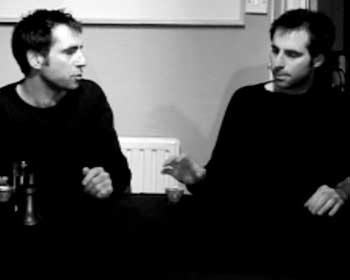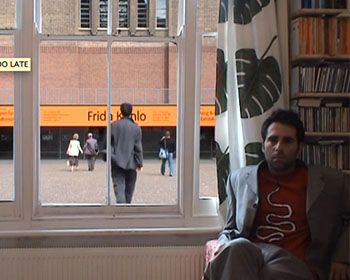Two men sit at a table, sipping coffee and talking fitfully about art. The man on the right is thoughtful and anxious, wondering aloud what art is and whether he can legitimately call himself an artist. The man on the left, a more sceptical and irreverent character who has, apparently, little interest in either of those questions, tries at first to reassure his companion but soon loses patience and finally throws a glass of water in his face.
Devlin habitually avoids making any art, preferring rather to languish in the Ur stages of the art process. He frets not about what artwork he will make but rather indulges himself in neurotic self-analysis about what art itself is.
Devlin is a self-confessed cynic. His videos are full of references to belief, and more specifically his inability to believe in himself as an artist or really to believe in art. He suggests that if he might only pretend to act like an artist, he might successfully pull off the illusion of being, or at least feeling, like an artist. In his work, Devlin conceives of a seductive and plausible decoy to deflect the attention of the audience away from the gaping absence of his own work.
Exploring the relationship between art, philosophy and football and the way they interact to create new meaning through its confusion.
Socrates was captain of what many people regard as the greatest football team ever never to have won the World Cup. They were the most talented and beautiful team but were beaten by Italy, a much more cynical side. Sócrates was capped sixty times for Brazil between May 1979 and June 1986.
He began playing football professionally in 1974 for Botafogo, but spent the majority of his career (1978 to 1984) with Corinthians in São Paulo, where he became famous for using football to challenge the existing military dictatorship.
In Window Tate we see the artist sitting in a room with a window behind him. Our view through the window is of the slope down into Tate Modern with the Frida Kahlo banners hanging above the entrance. And again the gentle play on artistic projection sets us following Devlin, whose figure we see through the window approaching the entrance. We watch while the action takes place behind his seated figure: he remains sitting, and behind him he walks purposefully down the ramp to the entrance as if recessed in his own mind, the thought seen simultaneously with the action. Then as with a blink, the name on the banner changes for a second or less to Daniel Devlin before returning to Kahlo as he himself turns to walk back up the ramp, back to and through the window.
Two men sit at a table, sipping coffee and talking fitfully about art. The man on the right is thoughtful and anxious, wondering aloud what art is and whether he can legitimately call himself an artist. The man on the left, a more sceptical and irreverent character who has, apparently, little interest in either of those questions, tries at first to reassure his companion but soon loses patience and finally throws a glass of water in his face.

![Conversation about art [2005] (SER) Conversation about art [2005] (SER)](https://old.susakpress.com/wp-content/uploads/2013/01/serbian_conversation.jpg)

![In Conversation With Sócrates [2010] (YUG) In Conversation With Sócrates [2010] (YUG)](https://old.susakpress.com/wp-content/uploads/2012/11/socrates.jpg)

![Conversation about art [2005] (CAT) Conversation about art [2005] (CAT)](https://old.susakpress.com/wp-content/uploads/2013/01/catalan_conversation.jpg)